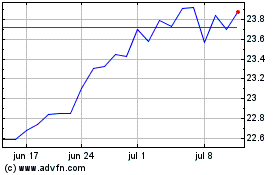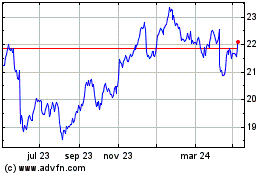Merger to Pay Off for CEO With $111 Million Bonus -- WSJ
12 Febrero 2020 - 2:02AM
Noticias Dow Jones
By Drew FitzGerald
This article is being republished as part of our daily
reproduction of WSJ.com articles that also appeared in the U.S.
print edition of The Wall Street Journal (February 12, 2020).
T-Mobile US Inc.'s John Legere is close to collecting more than
$100 million this spring after spending years guiding the cellphone
carrier's merger with Sprint Corp. through regulatory
obstacles.
While the merger was pending, the departing chief executive
secured a bonus that would vest in 2020 if the company's planned
takeover of smaller rival Sprint was consummated. A federal court
ruling Tuesday put that milestone within sight, though T-Mobile
must still win approval from another U.S. district court in
Washington conducting a routine review of the deal.
The outspoken executive plans to hand over the top job at
T-Mobile to deputy Mike Sievert on May 1, though Mr. Legere will
keep a seat on the company's board.
Mr. Legere's severance, including cash payments and
performance-based stock awards, was worth about $111 million based
on recent T-Mobile share prices, according to an analysis by
compensation-data firm Equilar Inc. That is separate from Mr.
Legere's regular compensation for 2019, the details of which the
company hasn't yet disclosed.
The compensation package "is on the higher side" compared with
other corporate CEOs, said Equilar analyst Courtney Yu, though on
"mergers with a long lead time until completion, it's not uncommon
to see executives receive special transaction grants to incentivize
them to stick around and provide stability in a period of
uncertainty."
The union of the country's No. 3 and No. 4 largest cellphone
carriers has sat in limbo for nearly two years, held back by
lengthy reviews by federal telecom and antitrust regulators. Those
federal officials eventually signed off on the merger with
conditions, but a coalition of state attorneys general said the
transaction would still push up wireless plan prices and sued to
block it.
T-Mobile said in a 2019 securities filing that its awards to
executives reflected "the immense regulatory and advocacy work
associated with a merger of this size and in this industry and
related business planning activities."
T-Mobile parent Deutsche Telekom AG hired Mr. Legere in 2012
after the company abandoned a planned merger with AT&T Inc.
Federal antitrust enforcers at the time said adding T-Mobile, then
the country's fourth-largest cellphone carrier, to AT&T would
lead to higher wireless prices.
Armed with a multibillion-dollar breakup fee and valuable
wireless spectrum licenses, the Bellevue, Wash., company closed a
reverse merger with prepaid service provider MetroPCS and went
public in 2013. T-Mobile's integration of the business now known as
Metro allowed both brands to quickly steal customers from rivals
like Sprint and AT&T.
Mr. Legere's total realized pay from 2013 through 2018 topped
$182 million, according to Equilar. That excludes his first year
with the German-owned company and his still-undisclosed 2019 pay
package.
Write to Drew FitzGerald at andrew.fitzgerald@wsj.com
(END) Dow Jones Newswires
February 12, 2020 02:47 ET (07:47 GMT)
Copyright (c) 2020 Dow Jones & Company, Inc.
Deutsche Telekom (TG:DTE)
Gráfica de Acción Histórica
De Mar 2024 a Abr 2024

Deutsche Telekom (TG:DTE)
Gráfica de Acción Histórica
De Abr 2023 a Abr 2024
